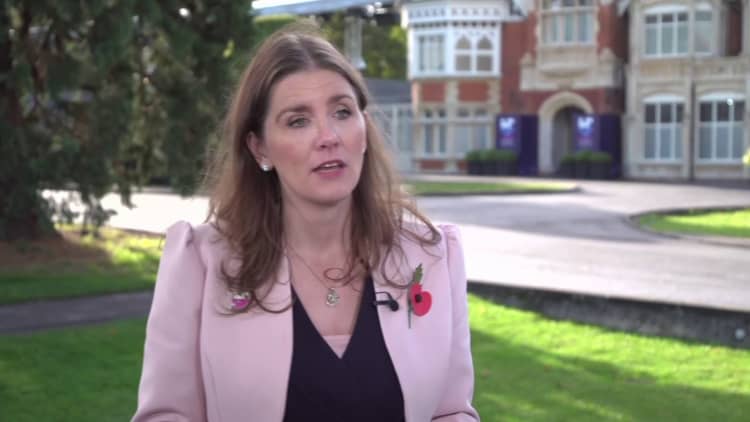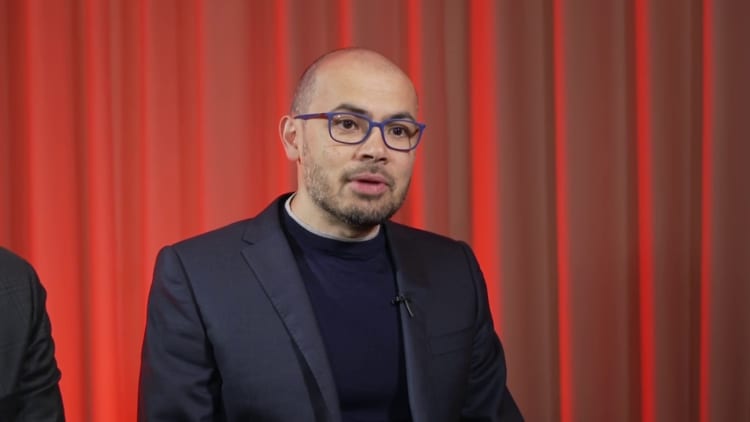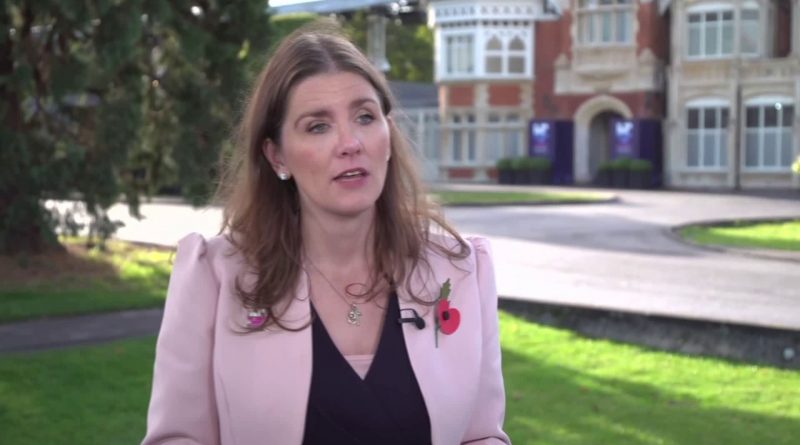China says it will back global consensus on AI amid tech clash with U.S.
BLETCHLEY, ENGLAND – NOVEMBER 1: US Secretary of Commerce Gina Raimondo and Michelle Donelan, Secretary of State for Science, Innovation and Technology listen as Vice Minister of Science and Technology of China Wu Zhaohui speaks on Day 1 of the AI Safety Summit at Bletchley Park on November 1, 2023 in Bletchley, England. The UK Government are hosting the AI Safety Summit bringing together international governments, leading AI companies, civil society groups and experts in research to consider the risks of AI, especially at the frontier of development, and discuss how they can be mitigated through internationally coordinated action. (Photo by Leon Neal/Getty Images)
Leon Neal | Getty Images News | Getty Images
China’s vice minister of technology said Beijing will cooperate with international counterparts — including the U.S. — to find common ground on frameworks for safe and responsible artificial intelligence development.
His comments were delivered at the U.K.’s AI safety summit, which officially kicked off Wednesday at Bletchley Park, England.
Wu Zhaohui, China’s vice minister of science and technology, said the country was willing to “enhance dialogue and communication in AI safety with all sides.”
China will contribute to an “international mechanism [on AI], broadening participation, and a governance framework based on wide consensus delivering benefits to the people, and building a community with a shared future for mankind,” he said, according to an official event translation.
The remarks arrive at a time when Beijing is locked in a tense technology dispute with the U.S.
China has been pushing through its own rules governing generative AI, a distinct form of AI that is trained on vast quantities of data to create new, human-like written and visual content in response to human inputs. Governments in the U.K., European Union, and U.S. are developing their own regulatory regimes for the technology.
China and 27 other countries signed a major agreement on AI Wednesday, known as the “Bletchley Declaration,” which promotes a “shared understanding of the opportunities and risks posed by frontier AI and the need for governments to work together to meet the most significant challenges.”

As part of this, nations agreed to an “urgent need to understand and collectively manage potential risks through a new joint global effort,” the U.K. government said.
The U.S. and China have been at loggerheads over tech for some time. That battle intensified this year, with the U.S. Department of Commerce announcing new trade restrictions on sales of U.S. tech giant Nvidia’s advanced H800 and A800 chips to China.
That has placed significant pressure on China’s generative AI developers, many of which rely on Nvidia’s chips.
Michelle Donelan, the U.K. science, innovation and technology minister, told CNBC’s Arjun Kharpal that it is a “massive” gesture that Chinese government officials chose to attend the U.K. AI summit on Wednesday.
“We do … at least have to try to engage them in this conversation,” Donelan said. “I always compare it to climate change. If we all act individually and in isolation, and not in a coordinated and collective fashion, we won’t have the desired impact.”
She added: “AI is exactly the same. It doesn’t respect geographical boundaries.”
The U.K. is looking to foster international coordination between China and its other global partners. This has proven a thorny issue with Beijing, which the U.S. has accused of national security risks surrounding its critical technologies such as AI. China denies these allegations.
U.S. Secretary of Commerce Gina Raimondo said earlier in the day that the U.S. is showing “unbelievable leadership” in its bid to ensure AI is developed more safely, “securing voluntary commitments by U.S. AI companies who have committed to safe secure and trustworthy.”

“We want to expand information sharing research and collaboration and also policy alignment across the globe,” she added.
Raimondo also said the U.S. would look to launch an AI safety institute, hot on the heels of the U.K announcing its own intentions for a similar initiative last week.
More AI summits to come
Donelan made clear that the U.K. summit won’t be the end of the international conversation surrounding artificial intelligence.
During the opening plenary Wednesday, the U.K. tech minister said that there would be two additional summits to follow — one in South Korea In six months’ time and the other in France next year.
Beyond this, the government also announced a £225 million ($273 million) investment into an AI supercomputer called Isambard-AI.
It is expected to be one of the most powerful supercomputers in Europe.
Still, executives and policymakers hoping for concrete action to be laid out from the summit have found themselves disappointed.
So far, proposals from the summit have expressed merely a commitment to finding global agreement on standards and frameworks needed for AI development — not actual policy steps.
Ivana Bartoletti, chief privacy officer at Indian IT giant Wipro, said that the Bletchley Declaration was correct in its aim to identify AI safety risks and build “shared scientific and evidence-based understanding of these risks, sustain that understanding as capabilities continue to rise.”
But, she added, but that more needs to be done.
“This is certainly important, but I do hope that when the Summit regroups in six months in South Korea, there will be real teeth and actions to these commitments,” she told CNBC in emailed comments Wednesday.
Source – CNBC




